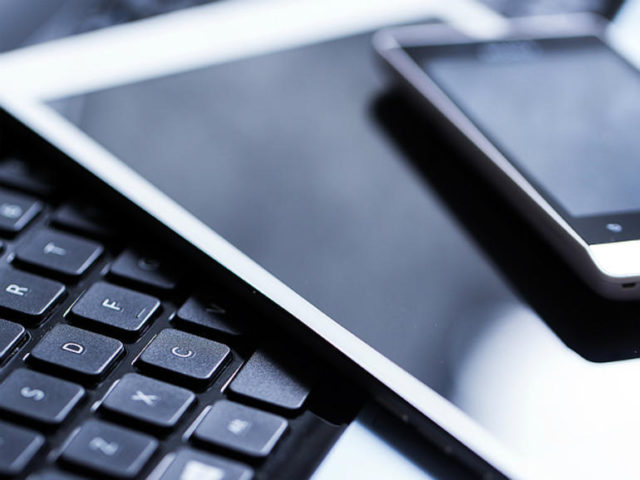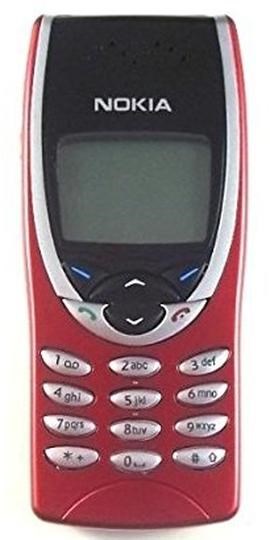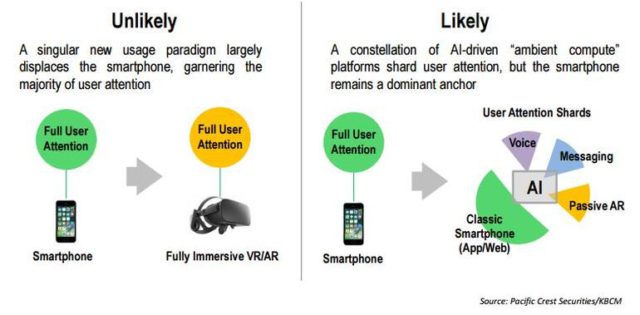Smartphones are far from dead. And the next 'boom' is not yet expected.

Ben Wilson of Pacific Crest does not believe that the likelihood of a device that will replace a smartphone in most scenarios is plausible. Instead, the smartphone will be complemented by AI services such as Amazon Alexa. The smartphone is just another step towards the reduction in the size of computers that has been happening over the past 60 years. We came to smartphones, abandoning computers, mini-computers, workstations, PCs, laptops and handhelds. Naturally, we can assume that the next phenomenon will be something smaller, such as smart watches or glasses. I made a similar assumption.
But there is no evidence to support this thesis and there is little chance for such a development in the near future. And the very idea of a constant decrease in computing technology has already been criticized. There was a time when people boasted about the diminutiveness of their phones, which in the last 10 years gained in size. Not everyone wants to have a device with a screen of 6 inches or more, but I bet that the screen of your current device is larger than that of your phone five years ago. . The competition has come down to reducing the thickness, not the size of the phones.

And there are a number of good reasons for this. When you see more content on the screen, you can do more useful things. Images and movies look better too. The benefits of large screens become apparent when you have to use the tiny screen on your smartwatch. They may offer perfect voice recognition, but you still won't be able to work on them as effectively as on a phablet. What's worse, it's impossible to fit enough memory and processing power into a watch case to compete with a smartphone. The only sensible scenario for smartwatches and fitness bracelets is to be used as add-ons, not replacements for a smartphone. For smart glasses, similar problems are characteristic, even if in this case there are more opportunities to solve them. The disadvantages of glasses relate to size, weight and autonomy, but social connotation is added to this, as the short life of the Google Glass project has shown.
The already mentioned Ben Wilson, an analyst who researches promising technologies for Pacific Crest, recently published the research note 'There Is No ‘Next Smartphone' [English, PDF]. He described the smartphone revolution as “a one-time event in the history of the computing platform that is unlikely to be repeated.” The colossal shift that has taken place before our very eyes over the past ten years will not be repeated.
I asked Wilson about a potential breakthrough in smartwatches or other wearable electronics. Here's what he replied: 'It is definitely foolish to think that computing interfaces will not evolve and it is likely that the number of scenarios using various wearable electronics will increase. But I believe that in the foreseeable future there will not be another major breakthrough like the transition from PCs to smartphones. What's more likely is the move to multiple fragmented platforms that will use artificial intelligence to engage the user as needed, allowing us to interact more passively with the computing process. '

Development scenario according to Wilson
In his work, he calls this 'AI-Driven Ambient Compute' (literally, 'AI-based background computing'). The smartphone monopolizes our focus. Be that as it may, AI allows some of these scenarios to be alleviated without requiring our attention. Wilson mentions Amazon Echo as an example. It is always possible to use an app to play music or perform a simple task, but it is faster and easier to do so with Alexa. Another example would be using AI to perform tasks inside messaging services instead of launching multiple apps.
The smartphone does not disappear anywhere, you just spend less time looking at the screen. In fact, I believe that smartwatches and fitness bracelets are already part of this trend. My Microsoft Band 2 tells me who is calling me even before the ringing sound, so I can ignore the call if necessary. I can also read the message on the bracelet screen, I don't need to take out the phone. And, as Wilson notes, the shift to less intuitive but narrower interactions is the stark opposite of fully 'immersive' virtual reality systems.
Darwinian speciation
Luckily for me, the idea of adding new devices is further confirmation of the 'Darwinian speciation' I've been writing about since the 80s.

Church clocks were needed when people could not afford to have their own.
Take a watch, for example. They used to be incredibly expensive and relatively rare. If you needed to find out the time, then you looked at the clock on the town hall, church or (later) train station. Over time, watches appeared in every home, and then, as the mechanisms decreased and became cheaper, personal watches appeared on a chain or on a strap for wearing on the wrist. Today everyone has several watches, and a watch on the wrist has become a fashion accessory. There are clocks on smartphones and PCs, on radios, on microwaves, and many other devices. There are many different types of watches in different niches and it is often difficult to say how many watches we have.
A similar sequence was observed with computers, and as the computing process became cheaper, more and more gadgets began to 'deal with' them. At first, computers were the exclusive domain of governments and giant corporations, but in 1977 we entered the 'one computer per home' era. Apple II has become something like a grandfather clock. Today, 'speciation' means we have a variety of computing devices in various form factors. These include PCs, laptops, tablets, e-readers, smartphones, game consoles, set-top boxes, NAS servers, and so on. Our cars and televisions are also computerized. From the experience of history, even more 'species' should appear. Smart watches, VR / AR headsets, and AI speakers are examples of these 'kinds'.
Of course, some form factors are gone. Much of the mini-computer industry has disappeared from the face of the earth (DEC, Date General, Prime, Wang), as have the workstation industry (Sun, Apollo, SGI), home and gaming computers (Acorn, Atari, Commodore, Sinclair) and handhelds ( Palm, Psion and PocketPC). But nevertheless, we do all the same things, but with different devices. Server subsystems replaced computers, and smartphones replaced iPag and iPod.
The smartphone as a class has not died and has not gone anywhere, as well as the scenarios for working with it, which we still repeat. The platform itself will not die as long as there is a need for its functionality, so I suspect that the smartphone will be useful to you for a long time.
Original material by Jack Scofield
Quite a balanced opinion, because in fact, the smartphone has almost reached its ceiling, it began to replace several devices at once, in fact, turning into a universal tool for almost any scenario. Many manufacturers position them as, if not the center, then an integral part of their ecosystems. And at this stage, there is still no obvious new leader who can displace smartphones and transfer them to the category of museum exhibits. Or will AR / VR reach such a level that they will become the new engines of innovation?
